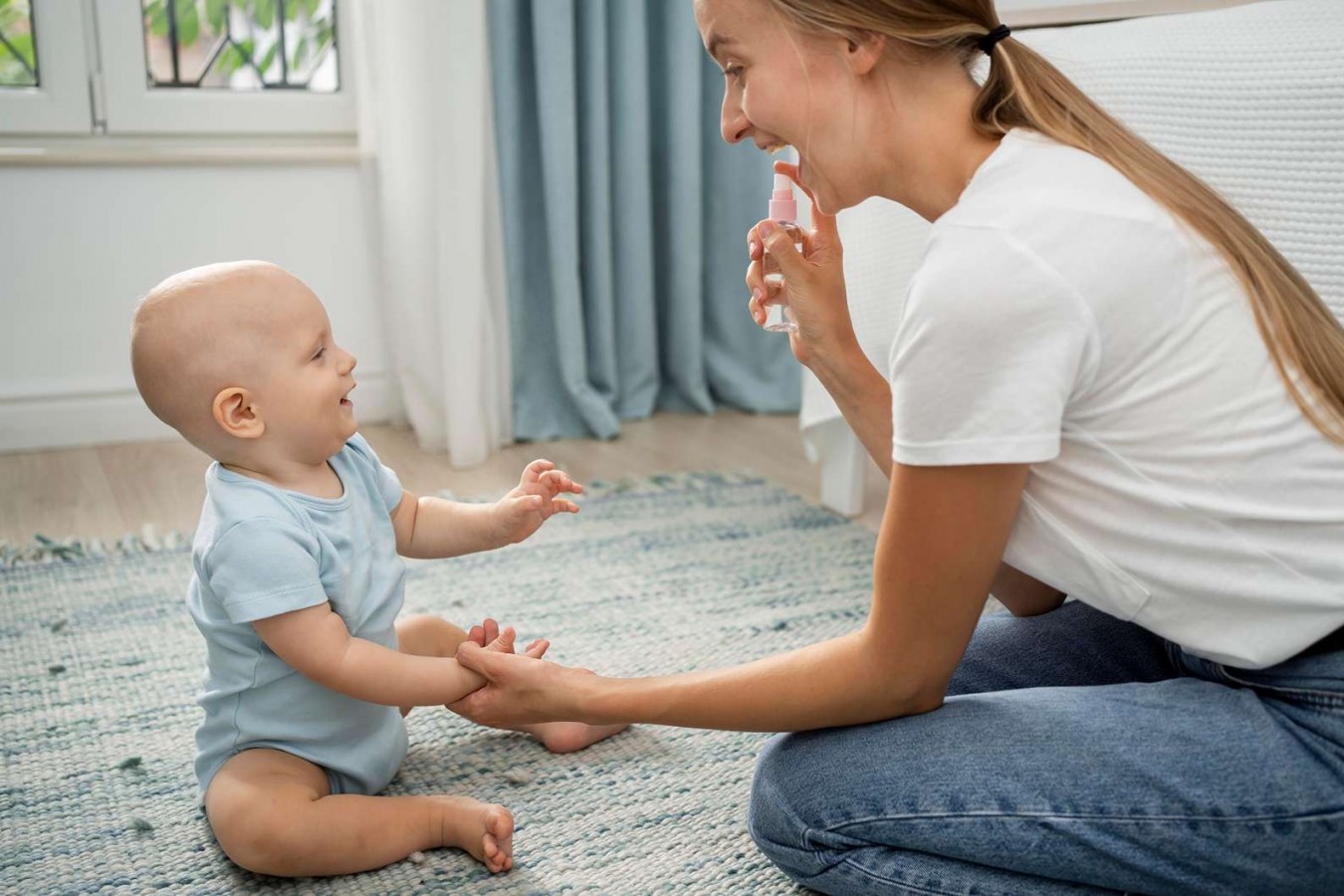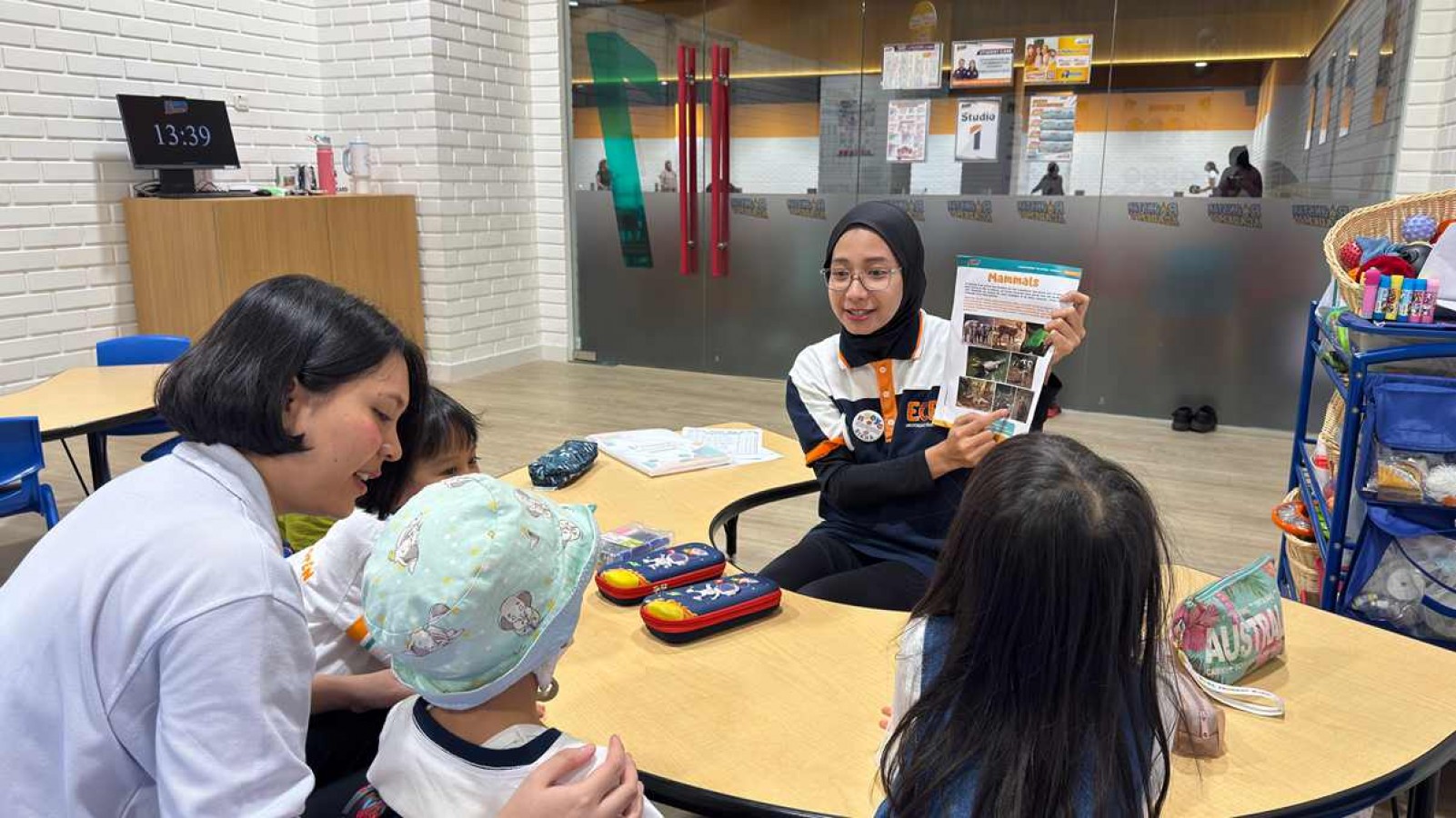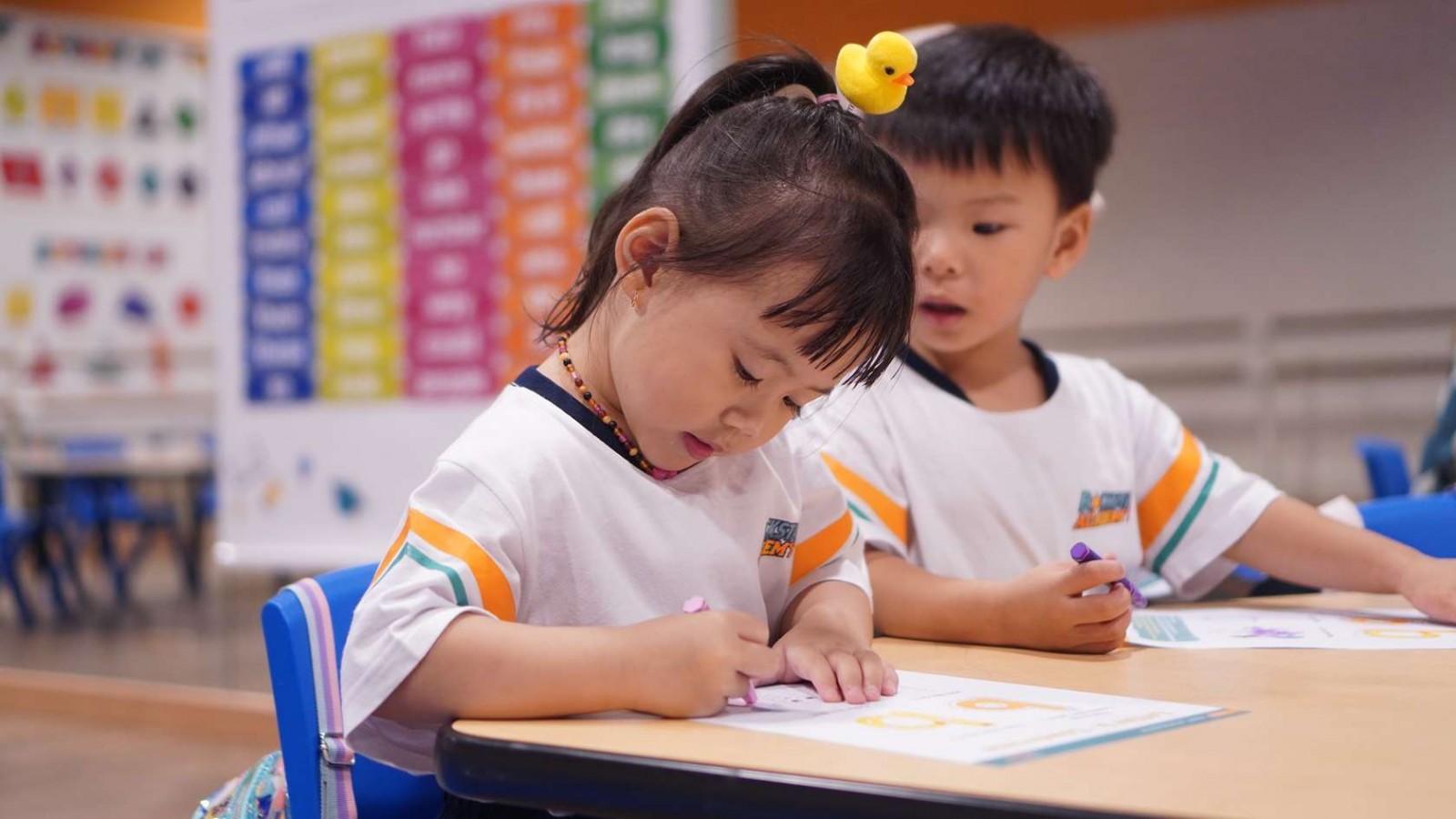How to Teach Your Baby to Talk: Parent's Guide

Waiting your baby to talk is something many parents eagerly wait for. But how to teach a baby to talk? When should it happen? And what if it doesn’t?
Teaching your baby to talk is about creating a world full of sounds, responses, fun conversations (even if it’s just babble), and lots of love. This guide is your go-to roadmap for understanding baby talk milestones, how you can support your little chatterbox, and what signs may indicate a speech delay.
So, grab your snack, cuddle up with your mini-me, and let’s explore how to help those tiny voices grow big and strong!
When Do Babies Start Talking?
Babies start talking long before they say their first real words. From the moment they’re born, babies are already learning how communication works by listening to your voice, watching your facial expressions, and even mimicking your sounds.
In the first couple of months (around 0–3 months), your baby communicates mainly through crying, cooing, and gurgling. These might not sound like much, but they’re the very first steps in learning how to use their voice.
By 4 to 6 months, you’ll start hearing adorable babbles like “ba-ba” or “da-da.” It’s their way of experimenting with sounds and trying to join the conversation. From 7 to 12 months, they’ll start to understand simple words like their name or “no,” and may even say their very first real word (often something like “mama” or “dada”).
Around their first birthday, most babies can say one to three simple words. As they grow into toddlers (between 12 to 24 months), their vocabulary will slowly grow. By age two, many toddlers can say around 50 or more words and start putting two words together into mini sentences like “want juice” or “go park.”
Baby Talk Milestones: A Quick Snapshot
|
Age |
Milestones |
| 0–3 months |
Cooing, smiling when spoken to, quiets at familiar voices |
|
4–6 months |
Babbling (e.g., ba-ba, da-da), responds to tone of voice |
|
7–12 months |
Understands “no”, responds to name, first words emerge |
|
12–18 months |
Follows simple instructions, says 5–20 words |
|
18–24 months |
Combines words, understands more than they say |
|
2–3 years |
Uses short sentences, vocabulary expands rapidly |
How to Help Your Baby Learn to Talk – Step by Step by Age
Helping your baby learn to talk isn’t just about teaching words. The way you talk, play, and interact changes as they grow, so here’s a simple, age-based guide to make those first words come naturally.
A. 0 to 6 Months: The Sound of Your Voice Matters Most
In the very beginning, your baby is soaking in every sound. They might not understand words yet, but they’re already learning the music of language.
- Talk face-to-face – Hold your baby close and look them in the eyes as you talk. Babies love faces and will watch your lips as you speak.
- Narrate your day – Chat about what you’re doing while feeding, changing, or bathing them. Even “Let’s wash your tiny toes” is language learning!
- Sing often – Your singing helps them hear rhythm, tone, and patterns in speech.
- Echo their sounds – If they coo or babble, repeat it back. This teaches turn-taking, the heart of conversation.
- Use a sing-song voice – Your exaggerated tone keeps their attention and makes speech more engaging.
B. 6 to 12 Months: Naming the World Around Them
Your baby is now curious about everything they see, and naming things is a powerful way to boost their vocabulary.
- Name and point – Say, “Look, a cat,” while pointing. As they grow, add details: “Look, a black cat.”
- Look at books together – You don’t need to read every word; just describe the pictures.
- Limit dummy/pacifier use – Only offer it at sleep time, and try to phase it out by 12 months so it doesn’t block speech.
- Play interactive games – Peek-a-boo and pat-a-cake teach turn-taking, listening, and focus.
C. 12 to 18 Months: Expanding Words and Meanings
Your toddler may try saying words, even if they get them slightly wrong. This is the perfect stage to encourage them without correcting harshly.
- Model the correct word – If they say “Ca!” when pointing to a cat, reply, “Yes, it’s a cat!”
- Offer choices – “Do you want apple or banana?” builds vocabulary and decision-making.
- Use sound-making toys and books – This sharpens listening skills.
- Sing action songs – Rhymes like “Row, Row, Row Your Boat” help them remember words through movement.
D. 18 to 24 Months: Building Confidence in Words
This is when repetition becomes your best friend.
- Repeat key words often – “Where are your shoes? Are you wearing blue shoes?”
- Give simple instructions – Keep them short, like “Get your coat” or “Shut the door.”
- Point and ask – “Where’s your ear?” or “Can you find your nose?”
- Cut down screen time – Stories, play, and real conversations are more valuable for learning to talk.
E. 2 to 3 Years: From Words to Sentences
Your child is now ready to connect words into simple sentences.
- Build on what they say – If they say “Sock off,” you can reply, “Yes, we’re taking your sock off.”
- Call their name first – This ensures they’re listening before you speak.
- Group words together – Show them a ball, teddy, and rattle, then say, “These are toys.”
- Use fun sound words – “Uh-oh” when something falls, or “meow” when you see a cat.
- Reduce background noise – Turn off the TV and radio so they can focus on your words.
- Talk during chores – If you’re cooking, say, “I’m cutting the carrots” or “Let’s wash the apples together.”
General Tips on How Parents Can Support Baby Talking
Here’s the best part: you don’t need a degree in linguistics or fancy gadgets to help your baby learn how to talk. YOU are your baby’s best teacher!
Talking to your baby throughout the day builds a strong language foundation. So, how can you support their journey from babble to words? Here are some easy and fun ways to help:
1. Talk Often — Even If They Can’t Answer Yet
Think of yourself as your baby’s personal tour guide to the world. The more you talk, the more they learn. Narrate your day like a storybook:
- “Now we’re putting on your blue socks. One sock… two socks! All done!”
- “Let’s open the door. Look — it’s sunny outside! Do you see the tree?”
By doing this, you’re teaching your baby:
- New words and vocabulary
- How words are ordered in sentences
- How language connects to the real world
They may not answer back just yet, but their little brain is soaking it all in like a sponge!
2. Respond to Their Babble
Babies babble to communicate, not just to make cute noises. So when they say, “Ba ba ba,” respond with something like:
“Ba ba? Are you talking about your bottle? Here it is!”
- This simple interaction shows them:
- Talking is a two-way conversation
- Their sounds matter and get a response
- They’re part of a social connection
Even if you don’t understand their sounds, treat them like they’re saying something important.
3. Read Together — Early and Often
You might think babies are too young for books, but it’s never too early to start. Choose baby-friendly books with bright, colorful pictures that contain simple sentences or repetitive phrases.
Reading boosts their:
- Listening and focus skills
- Vocabulary and word recognition
- Love for books and imagination
Make reading a cozy bonding time. Even just 5–10 minutes a day makes a big difference!
4. Sing Songs and Nursery Rhymes
You don’t need a great singing voice. The important thing is just your enthusiasm. Nursery rhymes and songs are magical tools for language learning. Songs help babies:
- Hear and remember word patterns
- Learn the rhythm and syllables of speech
- Recognize rhymes and repeated phrases
Plus, singing is just plain fun and gives you both a reason to giggle!
5. Name Everything
Be your baby’s vocabulary guide by naming whatever they’re looking at or playing with.
- “That’s a dog! The dog says woof!”
- “Here’s your teddy. He’s so soft!”
- “Look, a spoon. We use it to eat.”
This builds a mental dictionary where babies connect words to objects and meanings, making it easier for them to recall and use those words later.
6. Use Gestures and Facial Expressions
Babies are expert body language readers. That’s why gestures like waving, clapping, or nodding are super helpful.
Actions like waving, thumbs-up can help babies understand what words mean and how to use them in real life. They’ll likely mimic you, which leads to speaking.
7. Encourage Imitation
Babies love copying you. Try to make funny sounds or faces and wait for them to imitate.
Then, respond with claps, smiles, or a cheerful “Yay!” Every imitation helps build their confidence to try new sounds. Over time, these silly sounds turn into real words!
8. Avoid Baby Talk
It’s totally okay (and even helpful) to speak with warmth and exaggerated tone — like saying “Hiiii baaaaaby!” But avoid using too many made-up words.
- Instead of “choo-choo,” say “train” (then you can add “Choo-choo! The train goes fast!”)
- Instead of “num-num,” say “banana” or “lunch”
Using real words gives your baby a solid language foundation. Keep your tone fun and playful, but let your words be accurate. They'll copy what they hear so give them the right ones!
9. Switch Off Any Background Noises
One of the simplest yet most effective ways to help your baby learn to talk is to reduce background noise. This means turning off or lowering the volume on TVs, radios, or even loud household appliances when you’re spending time with your child.
Why is this important? Babies are still learning to focus on and process sounds. If there’s too much noise in the background, it can be harder for them to hear the clear pronunciation of words you’re saying. Imagine trying to learn a new language while a movie is playing loudly behind you—it would be distracting and confusing. That’s exactly how your baby might feel.
By switching off unnecessary sounds, you create a calmer environment where your baby can tune in to your voice and start making the connection between words and meaning. It also allows them to hear the rhythm, tone, and clarity of your speech more easily.
This doesn’t mean your house has to be silent all the time—normal household sounds are fine—but when you’re engaging in talking, reading, or singing activities with your baby, try to make it as quiet as possible. This way, your baby gets a clear “audio picture” of the words you use, helping them develop better listening and speaking skills.
Signs of a Possible Speech Delay
All babies develop at their own pace, but it’s good to be aware of signs that might point to a speech or language delay or even childhood stuttering.
Talk to your pediatrician or a speech-language therapist if:
- By 6 months: Not babbling or making many sounds
- By 9 months: Doesn’t respond to name or show interest in sounds
- By 12 months: No real words, doesn’t point or gesture
- By 18 months: Says fewer than 10 words, doesn’t follow simple directions
- By 2 years: Doesn’t combine words (“more juice”), hard to understand even for family
- Any age: Doesn’t seem to hear well, or has sudden loss of speech
The earlier you get support, the better. Speech therapy can do wonders and the earlier it begins, the easier it usually is to catch up.
So, How to Teach a Baby to Talk?
While your voice, love, and time are the most powerful tools, enrolling your little one in early childhood education can give their language skills an even bigger boost. That’s why we encourage parents to check out the Preschool & Kindergarten programs at Rockstar Academy.
As part of our well-rounded curriculum, children have the opportunity to participate in exciting events and competitions like the Elite Championships. These experiences are designed to encourage higher standards of achievement and physical activity, while also helping young learners build discipline, develop good sportsmanship, and learn valuable life lessons.
These programs are specially designed to build strong communication skills, spark curiosity, and lay the foundation for academic excellence.
And here’s the bonus: Rockstar Academy isn’t just about ABCs but we’re the best Sports & Performing Arts Academy, offering a variety of physical activity programs that support your child’s overall development.
From movement to music, every moment at Rockstar is a chance to grow, play, and shine. Ready to give it a try? Come in for a free trial class and see the magic for yourself!
FAQ
Is it normal for my baby to talk later than other babies?
Yes! Every child is different. Some are early talkers, some are late bloomers. What matters most is steady progress and understanding. If you’re worried, always trust your instincts and ask your pediatrician.
Should I teach my baby two languages?
Absolutely! Babies’ brains are amazing. They can learn two (or more!) languages without confusion. Just be consistent. For example, one parent speaks one language, the other speaks another.
Does screen time affect speech?
Too much passive screen time (TV, tablets) can delay speech. Instead of just watching, interact with your child. If you do use screens, watch together and talk about what’s happening.



